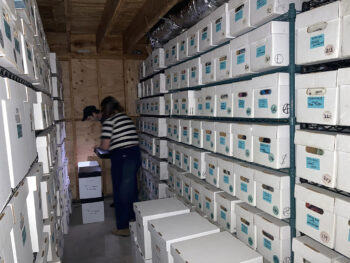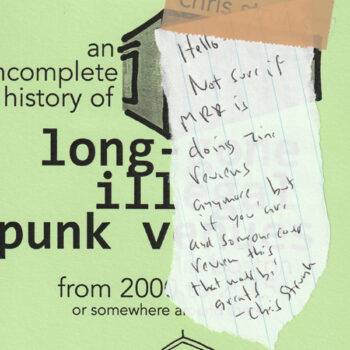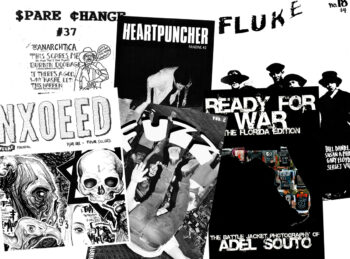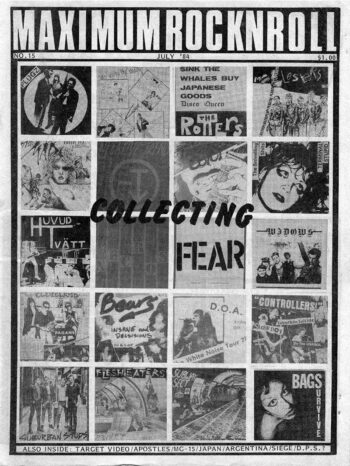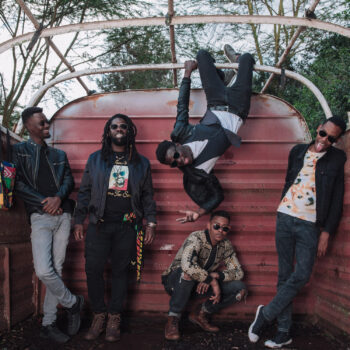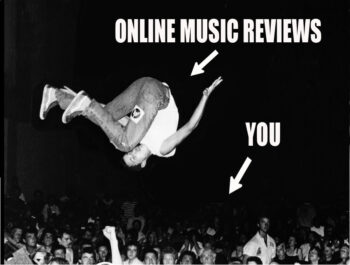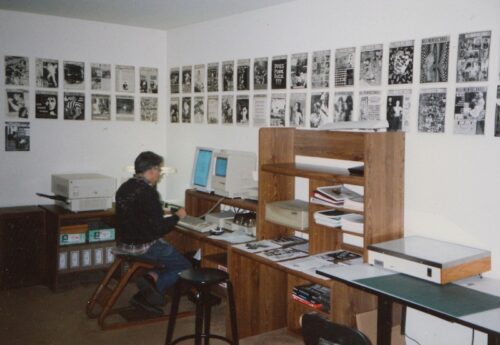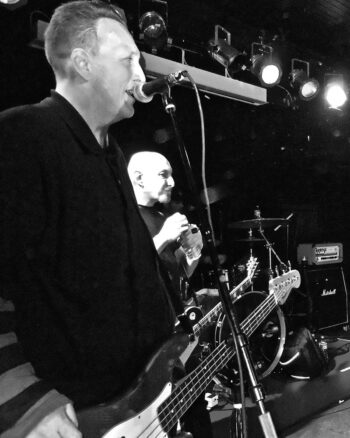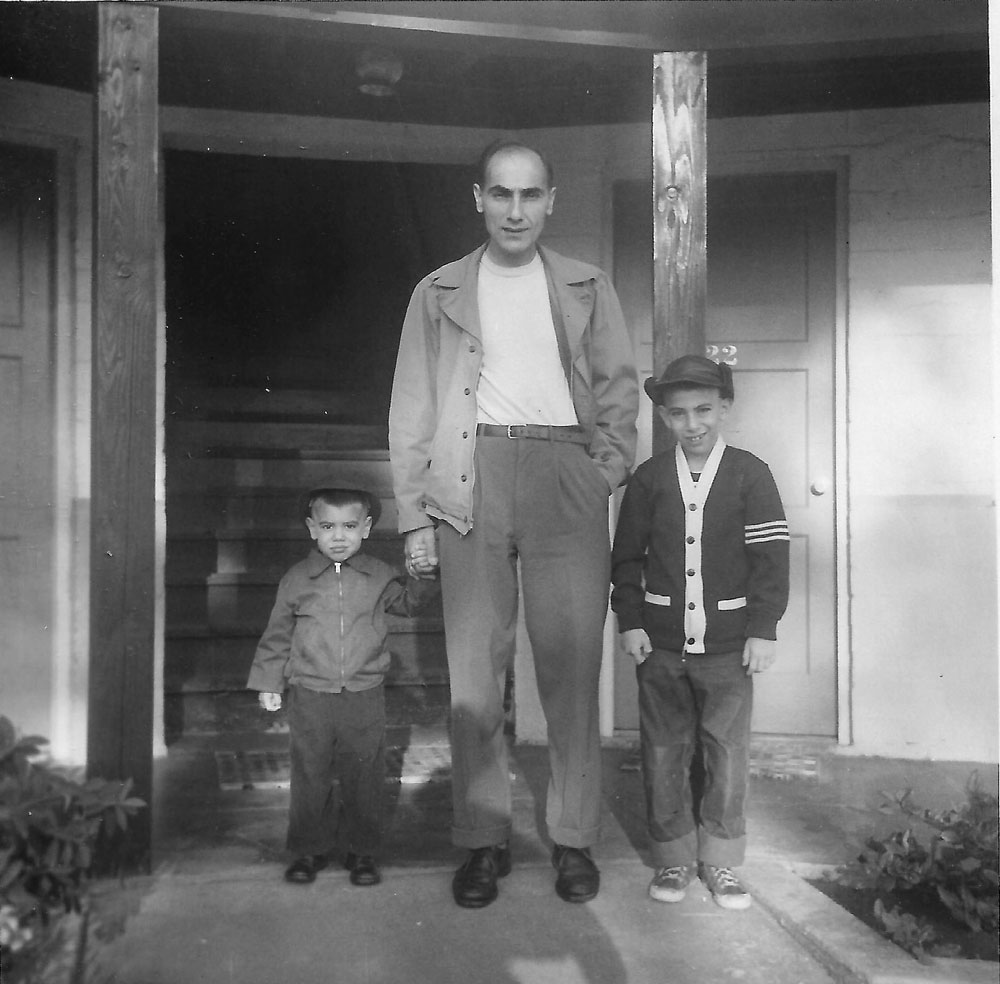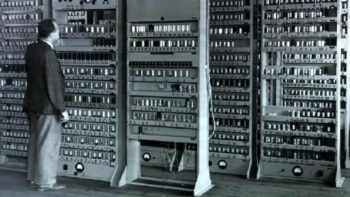Blast From the Past: Straightjacket Nation
This originally ran in MRR #301/June ’08, which you can grab here
Interview By Tim Scott
 MRR: Where/when was Straightjacket Nation born? Listening to your music it becomes quite obvious that your mother was smoking a lot of meth during her pregnancy.
MRR: Where/when was Straightjacket Nation born? Listening to your music it becomes quite obvious that your mother was smoking a lot of meth during her pregnancy.
Emily: The band started in early 2004 as a project between me and Dave (guitarist) jamming in the warehouse we lived in called the Pink Palace. In our spare time between our other bands we listened to hardcore music, spread lies about the band to hype it up, wrote songs, and tried to think of people to get to play. We sent tapes of our songs to Dan (as he lived interstate); he wrote lyrics and we eventually found Al at a show fucked up on spray paint, pulled the plastic bag off his head, and asked him if he’d like to go to America in May/June 2008 to play bass in a band called Straightjacket Nation.
MRR: What kind of lies were you spreading? Were they about your musical prowess?
Daniel: We lied about everything. We tried to present the band as a bunch of glue-huffing 16-year-olds hipped onto Chaos UK records and Japanese hardcore, using pseudonyms stolen from Australian gangsters and corrupt police. Australia has a pretty interesting gangland history because police corruption is so taken for granted here. This band was intended as a deception.
MRR: What were the early days like? Did you have a mindset from the beginning as to what kind of music you wanted to play or did it develop over time/shows/practices?
Daniel: Those laconic early days were spent choking riffs out of the blank-labelled pressings of Fix, Necros, and Antidote records, powered by the swigging of litres of cheap cola, living together in share houses, and squeezing band practice in between call-center work and other bullshit. Over time we developed a work ethic that became integral to how we approached the band. No love for any cunt that wasted time or acted like a slob. We all realized we had less time to fuck around with the band, so we didn’t fuck around. The songs got tighter as we worked harder and had to squeeze band practices around our other commitments: tours, work, school, writing, boxing.

MRR: You worked at a call center and boxed? What came first?
Daniel: Call center. Boxing came after seeing Emily fight at an amateur night. She was robbed.
Alistair-William: A call center is funding this upcoming US Tour. Have you had a colonoscopy in the last twelve months?
MRR: Straightjacket Nation has had a lot (some would say everything) to do with the rising success of Eddy Current Suppression Ring. You released the split, but I believe your first introduction to them was a more acrimonious affair, which included phrases like “beat-down” and “pass me the steering wheel lock.” Care to explain?
Daniel: We’d heard about a garage band with a mentally retarded guy on vocals, and apparently a member of the band worked at the record pressing plant that we believed had ripped us off. We went to the show to shake the guy down, and also because we are, like most people, curious about mental retardation and garage rock. It made a good story so we inflated it over time to include knuckle-dusters and death threats, but really we were just going to harass him and check out his band so we could make fun of them.
Emily: Eddy Current Suppression Ring has played heaps of shows and gotten popular from their own hard work and good music. They would no doubt be where they are today if we had never played together. For the record, the night we met I was never gunna beat anyone up but I was into seeing something happen.

MRR: For your side of the split, you chose to cover “I’m Stranded.” How do you feel that a lot of people’s introduction to Straightjacket Nation is hearing you belt out the greatest Aussie punk rock single of all time? That riff in the opening 20 seconds is unbeatable!
Dave: It was never meant to be an introduction to Straightjacket Nation. We were to press around 100-150 and sell them only at shows. Dollar signs got the better of us and the fact we had a bunch of covers left over so we pressed up a shitload more.
Daniel: I feel great. Time will prove who is the better band: apparently Keupper was so rapt about our attempt at “Stranded” that he’s trying to convince the others to cover “Terror Alert” at their next reunion in 2009.

MRR: OK, so it wasn’t an intended introduction to the band but the split was your first vinyl release right? Since then you have released more vinyl and put out the CD comp. At what point did you start to get more interest from overseas?
Dave: Nah, the 8-song 7″ was the first vinyl we released, straight after the demo and maybe one other tape. This was the record that the pressing plant fucked us over with and why we met Eddy Current Suppression Ring in the first place. I don’t think we have got that much interest from overseas? Most has come from our friends but I guess when we released the 6-song 7″ we were happy enough with it to send it to a bunch of distros and got some interest, only just enough to hopefully pull off a tour.
Alistair-William: We got more interest from overseas when Emily, Dave, and Dan all travelled overseas and spread the good word of the nation in other geographical regions. Also, the international punk scene is generally open-minded to transatlantic communication and the rest of the band is very much involved in this community.

MRR: I’m not saying that it’s going to happen—but how do you think you would react to or handle a sudden burst of attention or publicity in the same way that has happened to bands like, Fucked Up (who have in some ways helped generate it themselves) or Sex/Vid (who haven’t)?
Alistair-William: I saw that footage of Fucked Up on MTV. It was sick. Ridiculous, but sick. I reckon it is rad when really underground cultural stuff like punk and hardcore gets exposed in mainstream media. It’s always done over-the-top but it’s really cool. Watch GG Allin on Jerry Springer. Watch Johnny Rotten on Judge Judy. Watch Corey Worthington on A Current Affair.
Daniel: Break up.
Emily: We would have more appeal, which would give us more weight to determine the direction of modern hardcore punk. Once we have that, then we will release our upcoming hard rock record titled Power It Up.
MRR: Do you see a resurgence or interest in older Aussie hardcore and punk? The Not So Lucky Country comp is the main starting point for older Oz HC but what other bands do you think are overlooked?
Dave: A lot of the old Aussie hardcore is right where it should be—in dollar bins—but some exceptions are the likes of Civil Dissident (discography out soon!), Death Sentence, early Vicious Circle, and End Result, but you all know that already! I suggest the Eat Your Head 2xLP, all Melbourne but a good comp for sure.
Daniel: I don’t like old Australian hardcore for the most part. I think the Chosen Few and X wrote some of best punk tunes by anyone, but a lot of this music is overrated by spendthrift record collectors looking for the last scraps of punk rock authenticity to repair the psychological damage caused by the end of the Cold War. While I am yet to procure a copy, I think the Upsets’ Back To Afghanistan single is an incredible piece of Australian punk history. The starting point for anyone interested in Australian punk should be X’s Aspirations LP, the Murder Punk compilations, the first Birdman album, and the first two Saints albums.

MRR: Your songs in large part are a reaction against the uniformity of thought and approach and even image in modern hardcore and punk. The past is often romanticized and hardcore is no different. Do you think it was better or more interesting back then or was it just more squats and shittier drugs?
Daniel: We don’t romanticize the past. The fliers and artwork were better for the most part. But there are plenty of bands playing music today that is interesting and complicated and full of the friction and velocity of hardcore from 1981.
MRR: Do many old-timers come to your shows or is it still “for the kids, by the kids”?
Daniel: We are not kids and we were never playing for “kids.” Save that for the pederasts and the Peter Pan syndromes. There is no 7 Seconds or BYO element to what we do. The people who come to watch us are usually the fucked-up teenagers, the freaks, and the weirdos, and we like it complicated and nervy. Those looking for cookie-cutter politics, SSD-style unity raps, and feel-good bullshit usually stay away from us.
Dave: We get the odd burnout fuck that comes up and is all like “man, I haven’t seen a hardcore band like that in years” or some boring shit like that…

MRR: You have released your fair share of cassettes. Besides the obvious cost benefits, what is the appeal in tapes?
Daniel: They are an almost obsolete medium without mystic functionality, and their sound quality tends to obscure sheen in production. They are the perfect medium for listening to raw, loud music in between home and work.
Emily: Tapes are fucking sick, plus I don’t have a discman or iPod or whatever so that’s how I listen to music outside the house. The format is awesome—it’s cheap and easy and cool to make mix tapes. For the band, the artwork looks cool and they’re the only other option if you can’t afford vinyl and don’t wanna do CDs.
MRR: From the Pagans to One Life Crew, Cleveland has always produced bands not afraid of getting in people’s faces. Indeed, the more interesting bands in the last couple of years—Fucked Up/Sex Vid/Clockcleaner/Homostupids—know how to fuck shit up. Besides the free whale hot dogs you give away at shows, how do you guys go about “pushing the envelope,” for lack of a better phrase?
Daniel: We’ve got no interest in being considered “edgy” and hip by people who read Peter Sotos and masturbate to accident scenes. I don’t want to give people the impression we’re “out to cause a scene” or “out to change the world” or even “out to push the envelope.” We try to play hardcore music that is interesting and complicated but not full of intellectual pretense or even worse, retard pretense. This extends back to your question about the “kids.” I’d like to think in 2008 it’s possible for bands to play music that isn’t specifically catered to adolescent concerns, like trying to impress the people around you or being bummed because your mother won’t lend you 20 bucks or give you a hand job. Our music is written and performed almost entirely without concern of how the audience feels about it. I wouldn’t say this makes us an introspective band, but more that we don’t consider typical codifiers like crowd participation or the breakdown in barrier between band and audience as a high priority. These are worn-out topics that I don’t visit either in my lyrics or when we play live. Please ask this question a different way, I feel like we’re coming at it from different angles and it kinda cuts to the core of what makes this band important. I don’t want to talk about Cleveland in an interview about Straightjacket Nation.

MRR: When I say “push the envelope,” I don’t mean being “edgy” for the sake of being cool and different; how do you differentiate yourselves from the legion of other hardcore bands? What is cult hardcore? Has it got to do more than just old-school band shirts and spitting bile?
Daniel: Honestly, I think it’s hard to articulate something that we’re not consciously attempting. Or maybe it’s just something that I’d like to not think we’re doing consciously. The word DIY doesn’t mean anything to me. It suggests a certain naïve ideology and political economy that I’m not comfortable with. I like Poison Idea. Cult hardcore was just a term I came up with in reaction to this, and I like the idea of religious fanaticism/extremism. I’d suggest cult hardcore bands have little interest in “mosh,” shirts, shoe collecting, simple politics, sing-alongs and concepts like “old school” or “cult hardcore.”
MRR: What is it about religious fanaticism that you find interesting? Is it the fanaticism itself or more the concepts of faith that people become so fanatical about? Is it the scintillating design features on the “God Hates Fags” placards?
Daniel: I think everyone finds fanaticism and extremism interesting. It is foolish but courageous to believe in anything, and people who are willing to put their lives on the line for their stake on truth are always going to prevail.

MRR: Many bands that play this type of music get to the point where they find themselves biting their own tails. The good ones pack it in before they get to that stage. How many records do you have left?
Daniel: This band has taken almost four years to get to the point where we can write songs as strong as we do right now. We have six good records left.
Dave: Six! Fuck man, that’s pushing it. I feel like we can pull off another 7″, maybe something else, but then it is hardcore fuckin’ death.
Emily: I’m with Dave. I think we’ll release this LP, then probably another 7″ and then hardcore death, hard rock birth.
MRR: For a modern-day zine, Distort has been pretty prolific and regular. In the current “blogosphere” climate do you think that a lot of quality zines suffer from a lack of regular issues? It seems that people hedge their bets or sit on words when it comes to putting them in print. Unfortunately the same can’t be said about people championing the latest Arcade Fire record on their wordpress blog.
Daniel: If anything, the blog has staunched the flow of diary-entry-styled personal zines and messageboards have kind of mopped up the rest of the self-important useless political opinion rags, and this is a good thing. They slaughtered or relocated Amazonian tribes to print people’s stance on contraceptive products or how they felt about their ex-girlfriend’s vagina, and this is a damn tragedy. In the past couple of years, HeartattaCk finally uttered its last breath, MRR has really stepped up, and some great new zines have popped up. The zine I am most impressed with at the moment is Z-Gun. High-quality reading. So, if the blog is responsible for all this…
MRR: You have all done or are currently doing, zines, labels, distros, and show/tour promotion. Sitting on the other side of being in a band—what is the most frustrating or difficult thing you find when dealing with punk rock bands?
Dave: Bands that want everything done for them. People are becoming so fucking lazy towards doing bands, it is refreshing to see bands coming along wanting to work hard, put their own records out, book tours, and all that shit. Doing it for themselves.
MRR: More true DIY international bands are now touring Australia. Is it because there is more of an interest in hardcore or is it just easier now for promoters to book and tour bands?
Emily: People in Australia are no more interested in international hardcore and punk as they were a few years ago. The recent heightened interest seems to be coming more from overseas probably because more people have heard about Australia being an OK place to go. Also, obviously the internet has made the process of touring easier and the international punk scene a lot smaller in terms of finding out about bands and places, etc.
MRR: What sites/forums do you recommend for people who want to check out more about what is going on in the Australian scene?
Alistair-William: www.myspace.com
MRR: You are playing at this year’s Chaos in Tejas festival. I know Dave played there last year with Pisschrist, but what can be expected from Straightjacket Nation this year?
Dave: Last year was a blast. Expect us to be sunburnt and full as fuck with tacos trying not to vomit as we churn through it trying not to pass out.
Daniel: Spreading diseases with the facially tattooed sect.
Dave: Bridge-jumping nonsense.
Emily: Expect me to be sucking back a bottle of Emergency Essence before I play for fear of fucking up and getting the evil eye from Papa Straightjacket. I’ll also definitely be sunburnt and doing my best to get some high scores on American pinball machines.
Alistair-William: Sunburn, cocaine.

MRR: Because of Australia’s isolation, it seems that there is always a bit of a big deal when an overseas band tours. Did you experience being “the Australian band” with Pisschrist, and do you expect that with your upcoming tour or do you think US audiences are more accustomed to international bands coming through town?
Dave: Yeah, of course that is true here, but we get like three touring bands a year! The States are crawling with bands from everywhere. I don’t feel like it is any different with us; maybe some people will be keen to check us because of our “exotic location,” but more likely they want to talk about Rupture or see if we have any News 7″s in our back pockets!
MRR: What are the best/worst things about being in a punk rock band in Australia in 2008?
Dave: The isolation does have its upside with a pretty strong support for local bands playing here. But yeah, for the most part it is outrageous how much money we are spending on flights to the US and Europe for tours. There is no way we are going to make our money back so the best way to look at it is as a holiday for us and have some fucking fun. Also, with the recent jump in postage prices, it is becoming harder to trade records. We are sending records to distros for cost price and paying the postage to make it affordable for the average US record-buying scumbag.
Daniel: The best bands here work hard at what they do. I respect that. Thank you for doing this interview. Please check out distortcult.blogspot.com


